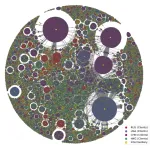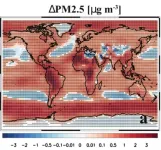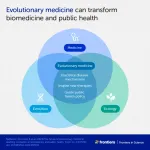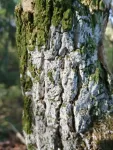(Press-News.org) From astronomical sums of money to opulent superyachts and lavish villas, the assets of the oligarchs providing the political and financial backing for Russian president Vladimir Putin's military ambitions have been publicly and fervently seized by Western nations since Russia's invasion of Ukraine.
Yet, the invasion—now in its second year—remains largely unabated as Russia's moneyed elite challenge sanctions in court or simply dodge them.
But a new study led by Dartmouth College researchers exposes a massive vulnerability for the Kremlin's critical cadre of billionaires—the small, secretive network of financial experts who manage their wealth. Published in the journal PNAS Nexus, the paper uses network science based on leaked documents to test the findings of an immersive sociological study of the offshore wealth managers who protect billionaires' fortunes. The results show that sanctions targeting these experts would wreak far greater damage than sanctioning oligarchs one by one.
"Rather than playing whack-a-mole with each individual oligarch, you take out one wealth manager and you effectively take out several oligarchs in one fell swoop," said co-author Brooke Harrington, a professor of sociology at Dartmouth who initiated the study after spending a total of eight years training as a private wealth manager and traveling to tax havens to observe the craft in action.
The researchers mapped the connections between more than 1.9 million wealth managers and their clients from Russia, China, the United States, and Hong Kong, as well as the more than 3.2 million network ties linking them. They relied on the Offshore Leaks Database maintained by the International Consortium of Investigative Journalists, which identifies wealth management professionals and ultra-rich individuals revealed through high-profile information leaks such as the 2016 Panama Papers, the 2017 Paradise Papers, and the 2021 Pandora Papers.
Mathematical "knockout experiments" revealed that these financial networks can be disrupted to the point of collapse by disabling a few key players, the researchers reported. They also found that wealthy individuals from autocratic nations such as Russia tend to rely on fewer managers with smaller client lists to ensure secrecy. Combined with the concentration of those wealth managers in the United Kingdom and European Union, this makes Russian oligarchs' offshore wealth particularly vulnerable to sanctions that target financial experts.
"Awareness of wealth managers and what they do is still in its infancy in terms of public policy. To end the invasion, there's an urgent need for sanctions informed by systematic evidence of the asset structure supporting Russia's campaign—our paper provides that evidence," Harrington said.
"To use a military analogy, we are providing a financial missile-guidance system for the countries trying to stop the war in Ukraine," she said. "A more targeted use of state-backed sanctions means a shorter war and less loss of life."
First author Ho-Chun Herbert Chang, a Ph.D. candidate at the University of Southern California, said that the unique combination of network science with sociology provided a practical map of the relationships between the wealthy and the people who shepherd their assets—one that can be used to enact policy. Chang, who graduated from Dartmouth in 2018, will join Dartmouth as an assistant professor of quantitative social science in fall 2023.
"The combination of ethnographic work and data science generated results that are grounded and precise while still telling a compelling human story," said Chang, who carried out the calculations and data visualizations. Co-authors and Dartmouth professors Feng Fu, an associate professor of mathematics and Chang's former adviser, and Daniel Rockmore, professor of math and computer science, provided the theoretical background and designs for the numerical experiments.
"Our methodology puts equal weights on empirical rigor, pragmatic intervention, and theoretical insight to understand collective human behavior," Chang said. "This allows us to be extremely precise about who and what we can target. We can even estimate the impact of specific sanctions and are developing metrics to identify new targets."
The study in PNAS Nexus serves as a first step toward what the authors hope is a new field of study they call "the complex systems of secrecy" that seeks to understand shadowy webs of power, wealth and corruption.
"Complexity contributes strategically to secrecy. That goes double for highly secretive activities such as offshore wealth management where there was essentially no data to be had unless someone leaked it," Harrington said. "Now that 'Big Data' are available on networks usually shrouded in secrecy, we can examine them properly and better understand them as a scientific phenomenon that we expect is far larger in scope and applies to many different domains of life."
The study in PNAS Nexus demonstrates how collaborations between network and social scientists are essential for extracting the structure of these nebulous systems from reams of data, then applying the findings in ways that effect change, Rockmore said.
"The study of sociological phenomena and social networks was in many ways the origin point of modern network science," he said. "Our work follows that theme but extends it to the secret wealth networks of offshore asset management. If the problem can be described in terms of relationships, then network science can be brought to bear."
###
END
Targeting wealth managers would cripple Russia's oligarchs
Sanctions on shadowy matrix of financial experts more effective than asset seizure
2023-02-28
ELSE PRESS RELEASES FROM THIS DATE:
The highlight advances in planetary science over the past 20 years
2023-02-28
With the development of human space technology, planetary exploration has become one of the most important space exploration activities of mankind. As of December 2021, a total of 252 planetary probes have been launched around the world. The missions reveal the deep space to humankind. In the new paper published in the journal Space: Science & Technology, Yixin Sun et al review some advances in planetary science made by these missions in the past years.
1.Research Advances in Terrestrial Planets
1. ...
Galactic explosion offers astrophysicists new insight into the cosmos
2023-02-28
COLUMBUS, Ohio – Using data from the James Webb Space Telescope’s first year of interstellar observation, an international team of researchers was able to serendipitously view an exploding supernova in a faraway spiral galaxy.
The study, published recently in The Astrophysical Journal Letters, provides new infrared measurements of one of the brightest galaxies in our cosmic neighborhood, NGC 1566, also known as the Spanish Dancer. Located about 40 million miles away from Earth, the galaxy’s extremely active center has led it to become especially popular with scientists aiming to learn more about how star-forming nebulae form and evolve.
In this case, ...
Internet treatment program to prevent child sexual abuse launched in several languages
2023-02-28
Following a successful pilot study, an online anonymous treatment program aimed at reducing child sexual abuse by providing treatment to individuals who exhibit sexual urges towards children is being launched across the EU. It is now available in Swedish, German, and Portuguese as well as in an updated English version. The treatment program, which has been developed by researchers and psychologists at Karolinska Institutet in Sweden, will be evaluated within the framework of an international research collaboration funded by the EU.
"Sexual exploitation of children is a major problem within ...
Liquid nitrogen spray could clean up stubborn moon dust
2023-02-28
PULLMAN, Wash – A liquid nitrogen spray developed by Washington State University researchers can remove almost all of the simulated moon dust from a space suit, potentially solving what is a significant challenge for future moon-landing astronauts.
The sprayer removed more than 98% of moon dust simulant in a vacuum environment with minimal damage to spacesuits, performing better than any techniques that have been investigated previously. The researchers report on their work in the journal, Acta Astronautica.
While people have managed ...
Annals HRSA Special Supplement February 2023 Media Tip Sheet
2023-02-28
LEAWOOD, Kansas—Articles appearing in an Annals of Family Medicine special supplement published yesterday contain observations, insights, and ideas for advancing health care equity, promoting interprofessional collaboration, transforming education, and improving primary care practices.
The supplement, titled, “Advancing Primary Care through Research, Education and Practice: Work of the Health Resources and Services Administration–Supported Academic Units for Primary Care Training and Enhancement,” highlights activities of six HRSA-funded academic units for primary care training enhancement. ...
Breathing is going to get tougher
2023-02-28
Not all pollution comes from people. When global temperatures increase by 4 degrees Celsius, harmful plant emissions and dust will also increase by as much as 14 percent, according to new UC Riverside research.
The research does not account for a simultaneous increase in human-made sources of air pollution, which has already been predicted by other studies.
“We are not looking at human emissions of air pollution, because we can change what we emit,” said James Gomez, UCR doctoral student and lead author of the study. “We can ...
Scientists unveil plan to create biocomputers powered by human brain cells
2023-02-28
Artificial intelligence (AI) has long been inspired by the human brain. This approach proved highly successful: AI boasts impressive achievements – from diagnosing medical conditions to composing poetry. Still, the original model continues to outperform machines in many ways. This is why, for example, we can ‘prove our humanity’ with trivial image tests online. What if instead of trying to make AI more brain-like, we went straight to the source?
Scientists across multiple disciplines ...
From anti-antibiotics to extinction therapy: how evolutionary thinking can transform medicine
2023-02-28
The word ‘evolution’ may bring to mind dusty dinosaur bones, but it impacts our health every day. For example, even though antibiotics were invented only a century ago, the evolution of antibiotic resistance is already a major concern. The rise in modern health problems such as obesity can also be traced back to evolutionary principles.
An article published in Frontiers in Science demonstrates how applying an evolutionary perspective to medicine can inspire new ways of preventing and treating disease.
“Evolutionary medicine holds promise to transform our understanding of why we get sick ...
Researchers from the Institute of Botany discovered a new type of coexistence between algae and fungi
2023-02-28
Researchers from the Institute of Botany, Czech Academy of Sciences, described the symbiotic relationship between fungi and algae which science has largely overlooked until now. The coexistence of algae and corticioid basidiomycetes, which are common in temperate forests, has been given a new name: alcobiosis.
Jan Vondrák of the Department of Taxonomy, Institute of Botany, and the first author of the study says “Years ago, during field trips, we were repeatedly puzzled to find a layer of green algae where some of the fungal coatings on wood or bark (so-called corticioid fungi) are disturbed. We discovered that this is a ...
The largest genomic study of rare cancer metastathic pheochromocytoma identifies patients at highest risk of metastasis and those who would respond to immunotherapy
2023-02-28
The new results will help to follow patients with a bad prognosis more closely, and to move towards more personalized treatments.
Mercedes Robledo, co-lead author, has been studying pheochromocytomas since 1996 and leads the CNIO group that has identified 5 of the 22 genes associated with these rare tumors.
The research analyzes an "exceptionally high" number of samples, something very difficult in rare diseases and achieved thanks to the collaboration of centers from countries all over the world.
Pheochromocytoma is a rare tumor, with an ...
LAST 30 PRESS RELEASES:
Molecular glue discovery: large scale instead of lucky strike
Insulin resistance predictor highlights cancer connection
Explaining next-generation solar cells
Slippery ions create a smoother path to blue energy
Magnetic resonance imaging opens the door to better treatments for underdiagnosed atypical Parkinsonisms
National poll finds gaps in community preparedness for teen cardiac emergencies
One strategy to block both drug-resistant bacteria and influenza: new broad-spectrum infection prevention approach validated
Survey: 3 in 4 skip physical therapy homework, stunting progress
College students who spend hours on social media are more likely to be lonely – national US study
Evidence behind intermittent fasting for weight loss fails to match hype
How AI tools like DeepSeek are transforming emotional and mental health care of Chinese youth
Study finds link between sugary drinks and anxiety in young people
Scientists show how to predict world’s deadly scorpion hotspots
ASU researchers to lead AAAS panel on water insecurity in the United States
ASU professor Anne Stone to present at AAAS Conference in Phoenix on ancient origins of modern disease
Proposals for exploring viruses and skin as the next experimental quantum frontiers share US$30,000 science award
ASU researchers showcase scalable tech solutions for older adults living alone with cognitive decline at AAAS 2026
Scientists identify smooth regional trends in fruit fly survival strategies
Antipathy toward snakes? Your parents likely talked you into that at an early age
Sylvester Cancer Tip Sheet for Feb. 2026
Online exposure to medical misinformation concentrated among older adults
Telehealth improves access to genetic services for adult survivors of childhood cancers
Outdated mortality benchmarks risk missing early signs of famine and delay recognizing mass starvation
Newly discovered bacterium converts carbon dioxide into chemicals using electricity
Flipping and reversing mini-proteins could improve disease treatment
Scientists reveal major hidden source of atmospheric nitrogen pollution in fragile lake basin
Biochar emerges as a powerful tool for soil carbon neutrality and climate mitigation
Tiny cell messengers show big promise for safer protein and gene delivery
AMS releases statement regarding the decision to rescind EPA’s 2009 Endangerment Finding
Parents’ alcohol and drug use influences their children’s consumption, research shows
[Press-News.org] Targeting wealth managers would cripple Russia's oligarchsSanctions on shadowy matrix of financial experts more effective than asset seizure






